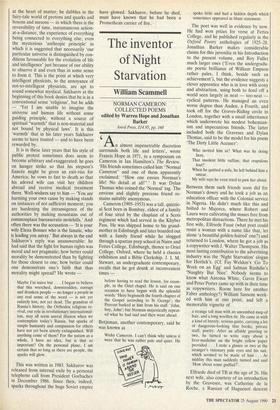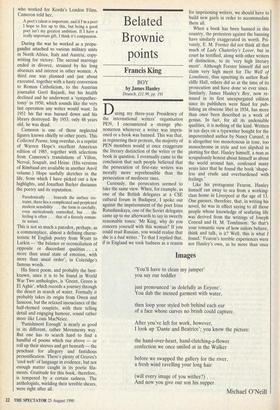The inventor of Night Starvation
William Scammell
NORMAN CAMERON: COLLECTED POEMS edited by Warren Hope and Jonathan Barker
Anvil Press, £14.95, pp. 160
An almost impenetrable discretion surrounds both life and letters', wrote Francis Hope in 1971, in a symposium on Cameron in Ian Hamilton's The Review. `His friends sometimes called him "Normal Cameron" and one of them apparently exclaimed: "How one envies Norman's life! No detail at all!" ' It was Dylan Thomas who coined the 'Normal' tag. The envious and slightly precious friend re- mains suitably anonymous.
Cameron (1905-1953) was a tall, quizzic- al Scot born in Bombay, eldest of a family of four sired by the chaplain of a Scots regiment which had served in the Khyber Pass. He was shipped home to his grand- mother in Edinburgh and later boarded out with a family friend while he slogged through a spartan prep school in Nairn and Fettes College, Edinburgh, thence to Oriel College, Oxford, where he held a classics exhibition and a Bible Clerkship. J. I. M. Stewart, an undergraduate contemporary, recalls that he got drunk at inconvenient times -
before having to read the lesson, for exam- ple, in the Oriel chapel. He is said on one occasion to have begun with the splendid words: 'Here beginneth the fourth chapter of the Gospel according to St George'; the Provost barked at him from his stall: 'John, boy, John'; but Norman majestically repeat- ed what he had said and then went ahead.
Betjeman, another contemporary, said he was known as
Wishy Cameron. I can't think why unless it were that he was rather pale and quiet. He
spoke little and had a hidden depth which sometimes appeared in blunt statement.
The poet was well in evidence by now. He had won prizes for verse at Fettes College, and he published regularly in the Oxford Poetry anthologies of 1925-28. Jonathan Barker makes considerable claims for this juvenilia in his Introduction to the present volume, and Roy Fuller much larger ones (Even the undergradu- ate poetic brilliance of William Empson rather pales, I think, beside such an achievement'), but the evidence suggests a clever apprentice who is in love with irony and abstraction, using both to fend off a world seen largely in neat — too-neat cyclical patterns. He managed an even worse degree than Auden, a Fourth, and took off for the Graves-Riding circle in London, together with a small inheritance which underwrote his modest bohemian- ism and impecunious friends. The latter included both the Graveses and Dylan Thomas, said to be the model for his poem `The Dirty Little Accuser':
Who invited him in? What was he doing here, That insolent little ruffian, that crapulous lout?
When he quitted a sofa, he left behind him a smear.
My wife says he even tried to paw her about.
Between them such friends soon did for Norman's dowry and he took a job as an education officer with the Colonial service in Nigeria. He didn't much like this and bolted to Majorca, where Robert and Laura were cultivating the muses free from metropolitan distractions. There he met his first wife, Elfriede Faust (what poet could resist a woman with a name like that, let alone 'a beautiful golden-haired' one?) and returned to London, where he got a job as a copywriter with J. Walter Thompson. His most lasting contribution to the advertising industry was the 'Night Starvation' slogan for Horlick's. (Cf. Fay Weldon's 'Go To Work on an Egg' and Salman Rushdie's `Naughty But Nice'. Nobody seems to know what Antonia White, Gavin Ewart and Peter Porter came up with in their time as copywriters. Room here for another Faber anthology?) William Sansom work- ed with him at one point, and left a memorable vignette of
a strange tall man with an uncombed mop of hair, and a long woollen tie. He came in with a kind of breezy, serious gusto, carrying a lot of dangerous-looking thin books, private stuff, poetry. After an affable greeting or two, he turned to write copy about a liver-medicine on the bright yellow paper provided . . . I stole a glance or two at the stranger's visionary pale eyes and his suit. which seemed to be made of hair . . . At midday this man suddenly turned and said 'How about some gudfud?'.
Elfriede died of TB at the 'age of 26. His next wife, also courtesy of an introduction by the Graveses, was Catherine de la Roche, a Russian of Huguenot descent who worked for Korda's London Films. Cameron told her,
A poet's talent is important, and if I'm a poet I hope to live up to this, but being a good poet isn't my greatest ambition. If I have a really important gift, I think it's compassion.
During the war he worked as a propa- gandist attached to various military units in North Africa, Italy and Austria, copy- writing for victory. The second marriage ended in divorce, strained by his long absences and interest in other women. A third one was planned and just about executed, together with a hasty conversion to Roman Catholicism, to the Austrian journalist Gretl Bajardi, but his health declined and he underwent a `sympathec- tomy' in 1950, which sounds like the very last operation any writer would want. In 1951 his flat was burned down and his library destroyed. By 1953, only 48 years old, he was dead.
Cameron is one of those neglected figures known chiefly to other poets. This Collected Poems, long overdue, is a reprint of Warren Hope's excellent American edition of 1985, together with selections from Cameron's translations of Villon, Nerval, Soupalt, and Heine. (His versions of Rimbaud are available in another Anvil volume.) Hope usefully sketches in the life, from which I have picked out a few highlights, and Jonathan Barker discusses the poetry and its reputation.
Paradoxically . . . beneath the surface res- traint, there lies a complicated and perplexed modern sensibility . . . the form is carefully, even meticulously controlled, but . . . the feeling is often . . . that of a fiercely roman- tic nature.
This is not so much a paradox, perhaps, as a commonplace, almost a defining charac- teristic bf English poetry from Wyatt to Larkin — 'the balance or reconciliation of opposite or discordant qualities . . . a more than usual state of emotion, with more than usual order', in Coleridge's famous words.
His finest poem, and probably the best- known, since it is to be found in World War Two anthologies, is 'Green, Green is El Aghir', which records a journey through the desert in search of water. Formally it probably takes its origin from Owen and Sassoon, but the relaxed insouciance of the half-rhymed couplets, with their telling detail and engaging humour, sound rather more like Louis MacNeice.
`Punishment Enough' is nearly as good in its different, rather Movementy way. But one has to search hard to find a handful of poems which rise above — or roll up their sleeves and get beneath — the penchant for allegory and fastidious personification. There's plenty of Graves's `cool web' of language in evidence, but not enough matter caught in its poetic fila- ments. Gratitude for this book, therefore, is tempered by a certain sadness. The anthologists, wielding their terrible shears, were right after all.











































 Previous page
Previous page